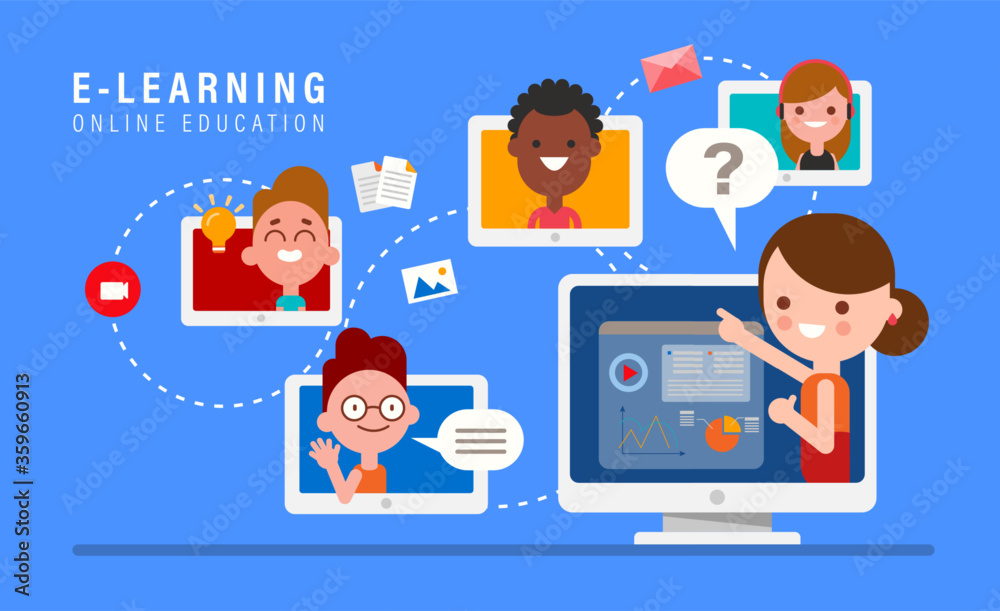Discovering the Relevance of E-Learning for Kids in the Modern Educational Landscape
In today's swiftly developing academic landscape, the value of e-learning for youngsters can not be overstated. E-learning platforms offer unparalleled availability and adaptability, satisfying varied understanding designs while cultivating necessary digital literacy abilities. These systems incorporate interactive components that enhance involvement and promote critical reasoning, preparing pupils for future challenges. As we take into consideration the transformative influence of technology on education, it is essential to check out exactly how e-learning can better enrich learning end results and cooperation amongst young learners. What details benefits does e-learning deal that standard methods may not, and exactly how can these be made best use of for ideal educational advancement?
Advantages of E-Learning
E-learning offers countless benefits for youngsters, changing the way they get knowledge and abilities. One of the primary advantages is access. E-learning platforms make it possible for kids to access academic material from practically anywhere, damaging geographic obstacles and facilitating constant discovering. This is specifically helpful for students in remote or underserved locations, guaranteeing they have level playing fields to top quality education.

Additionally, e-learning promotes technological proficiency. As kids navigate electronic platforms, they acquire essential computer abilities and end up being proficient at using various software application and tools, which are crucial in today's electronic age. Moreover, e-learning can integrate interactive aspects such as video clips, games, and quizzes, making the discovering experience much more enjoyable and engaging.
In addition, e-learning sustains diverse finding out needs via adjustable content, satisfying individual preferences and promoting inclusivity. Altogether, e-learning provides a functional, inclusive, and interesting method to contemporary education.
Enhancing Learning Results
Structure on the advantages highlighted, enhancing finding out results via e-learning is a multifaceted endeavor that leverages modern technology to improve instructional efficacy. E-learning systems supply customized discovering experiences, permitting customized educational techniques that accommodate specific student requirements. Adaptive discovering modern technologies evaluate pupil efficiency in real-time, providing immediate feedback and changing the trouble of jobs accordingly. This guarantees that trainees continue to be engaged and challenged, promoting a deeper understanding of the material.
Additionally, e-learning assists in access to a large array of sources, consisting of interactive simulations, educational video games, and multimedia web content. These tools can elucidate complex concepts and make discovering more interesting, consequently boosting retention prices. The assimilation of analytics additionally enables educators to track progress, identify finding out voids, and carry out targeted interventions.
Collaboration and communication are additionally substantially enhanced through e-learning. Digital classrooms and conversation online forums offer possibilities for peer communication and cumulative analytical, which are crucial for enhancing learned principles. Furthermore, the versatility of e-learning enables asynchronous understanding, fitting various knowing paces and routines.
Fostering Important Thinking
While enhancing finding out outcomes is a substantial benefit of e-learning, one more profound effect hinges on its capacity to foster critical reasoning among trainees. E-learning systems frequently include interactive tasks, simulations, and analytical jobs that require trainees to assess details, examine numerous outcomes, and make reasoned choices. These tasks surpass memorizing memorization, encouraging pupils to engage deeply with material and use their understanding in useful scenarios.
Additionally, the self-paced nature of e-learning empowers trainees to discover topics at their own speed, advertising a reflective method to learning. This autonomy enables students to examine presumptions, seek added sources, and attract links in between different principles, therefore nurturing a state of mind tailored towards crucial analysis.
On top of that, e-learning tools usually include collaborative features such as discussion online forums and team jobs, which additionally boost critical reasoning. Engaging with visite site peers in a digital environment requires pupils to express their ideas clearly, consider alternative perspectives, and construct rock-solid disagreements. These communications are vital in developing critical thinking abilities that are crucial for scholastic success and future specialist undertakings.
Hence, e-learning sticks out not just for its capability to improve academic outcomes but additionally for its considerable function in developing important, independent thinkers.
Digital Proficiency Skills
How can students grow in an electronic world without mastering electronic literacy abilities? In today's technology-driven period, electronic literacy has actually become a foundation of modern education. It encompasses a wide spectrum of expertises, from using and navigating the net software application applications to comprehending online safety and security and honest behavior. As e-learning comes to be significantly widespread, the requirement for pupils to establish these abilities can not be overemphasized.
Digital proficiency enables pupils to effectively situate, review, and make use of information, cultivating a setting conducive to self-directed understanding. It also furnishes them with the capacity to determine qualified sources from undependable ones, an important ability in an age where false information is rampant. By acquainting themselves with digital tools, trainees can improve their creative thinking and collaboration through various on the internet systems and multimedia jobs.
Moreover, electronic proficiency is intrinsically linked to future job readiness. Employers across industries seek individuals who are experienced at making use of electronic modern technologies to solve problems and innovate. Early exposure to these skills via e-learning systems positions pupils to be competitive in a global task market. Integrating electronic proficiency right into the academic curriculum is not simply helpful however necessary for supporting well-rounded, future-ready citizens.
Future of Education And Learning
As we stare right into the future of education, it becomes noticeable that technological improvements will certainly play an essential my sources role fit the finding out landscape. E-learning platforms are readied to advance, ending up being much more interactive and customized, satisfying the distinct demands of each pupil. Synthetic Knowledge (AI) will likely go to the leading edge of this change, making it possible for adaptive learning experiences that can determine and resolve specific strengths and weaknesses in real-time.

In enhancement, the ubiquity of internet gain access to will certainly help with worldwide classrooms, damaging down geographical obstacles and advertising cross-cultural learning experiences. This connection will certainly enable trainees from varied histories to work together, cultivating a more inclusive and thorough instructional experience.
However, these advancements also necessitate a concentrate on electronic citizenship and cybersecurity. Educators and policymakers must collaborate to ensure that children are furnished with the skills to navigate this digital world responsibly and safely. The future of education, therefore, depends upon integrating technical technology with moral considerations.
Conclusion
E-learning's combination right into contemporary education and learning is important, offering improved availability, customized discovering experiences, and cultivating essential thinking. The vibrant nature of e-learning addresses varied finding out designs and engages students interactively, ensuring they are geared up with required skills for future challenges.
E-learning systems use customized finding out experiences, permitting for tailored instructional methods that cater to individual pupil demands.While improving learning outcomes is a substantial advantage of e-learning, one more profound impact exists in its capability to cultivate critical thinking amongst trainees. As e-learning becomes significantly prevalent, the necessity for pupils to establish these skills can not be overemphasized.
Early direct exposure to these Learn More Here abilities with e-learning platforms placements trainees to be affordable in a global task market. The vibrant nature of e-learning addresses varied learning styles and involves trainees interactively, ensuring they are equipped with needed skills for future obstacles.